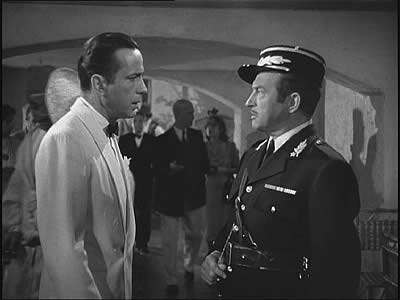I am shocked–shocked!–to find that politics is going on in here!

Meanwhile, among the state Leftists….
At Common Dreams, Progressives
discover that party politics has mechanisms to favor insiders, and to make it difficult for candidates to get a nomination without the approval of the party aparat. Most react with horror, and decide to change this stifling state of affairs–by committing themselves even more fervently to partisan politicking. This time in the name of strengthening our democracy,
which requires wresting control of the Party out of the hands of the very people who write the rules of engagement. See, if you can win, then you can change things so that the party establishment can’t keep you from winning anymore.
Elsewhere, Stanley Fish discovers that the government-appointed directors of politically-run Universities sometimes put partisanship and political cronyism above academics in appointing senior administrators. The way he reckons it, a good result, if there is one, will not justify a bad practice, and putting someone with no academic experience in charge of an academic institution is just that. Nor is it necessary, even in the straitened circumstances (hardly unique to Colorado) the university faces. There is another way, and Michael Carrigan, one of the three (Democratic) regents to vote against Benson, pointed to it when he told me,
I can't believe that there are no candidates out there with both business acumen and academic credentials.
He is right. Those candidates were out there and they still are. Perhaps the next university tempted to go this route will take the trouble to look for them.

Mister Buckles is taking back our democracy from the party establishment!
Playing the government game and taking the government’s patronage means playing by the government’s rules. The longer you keep walloping at it, the more stuck in it you get. Primary goals — like solidarity and social justice, or intellectual discovery and creation — have already been replaced by secondary goals — like winning elections or tugging on legislative purse-strings. Soon the secondary goals are swallowed up by tertiary goals — spending four-year election cycle after four-year election cycle bashing yourself against the hardened barricades of the Party establishment, or wrangling with political factions over the best process to find and bring in a boss combining the right balance of academic chops with the political connections needed to keep the university mainlining politically appropriated funds. This is no way to make a revolution. It’s not even a way to make small change.
In anarchy, there is another way. When the things that matter most in our lives are the things that we make for ourselves, each of us singly, or with many of us choosing to work together in voluntary associations, there will be no need to waste years of our lives and millions of dollars fighting wars of attrition with back-room king-makers–because we will not need to get any of the things that they are trying to hoard. There will be no need to fight battles between academic senates and Boards of Trustees over the right balance of academic competence and political savvy in a university President –because when universities’ funding rises from the people who participate in, or care about, the academic community, rather than being handed down by the State, the university has no need for political bodies like Boards of Trustees or smooth-operator self-styled Chief Executive Officers. We will not need to get any of the favors that they might be able to grant. When we go after the State’s patronage, politics makes prisoners of us all. But freedom means that when the powers that be try to rope you along for something stupid, or try to snuff out something brilliant, we can turn around, walk away, and do things for ourselves–whether they like it or not.
Further reading:
- GT 2006-04-16: Direct Action and GT 2006-07-06: Direct Action comix #2
- GT 2007-10-25: Radical healthcare reform and GT 2007-11-16: Urban homesteading
- GT 2005-06-25: Shut up and put up and GT 2006-06-16: And around we go…
- GT 2004-05-01: Free the Unions (and all political prisoners)!
- Randolph Bourne (1918): The State, Part II, on the structure and role of the party system